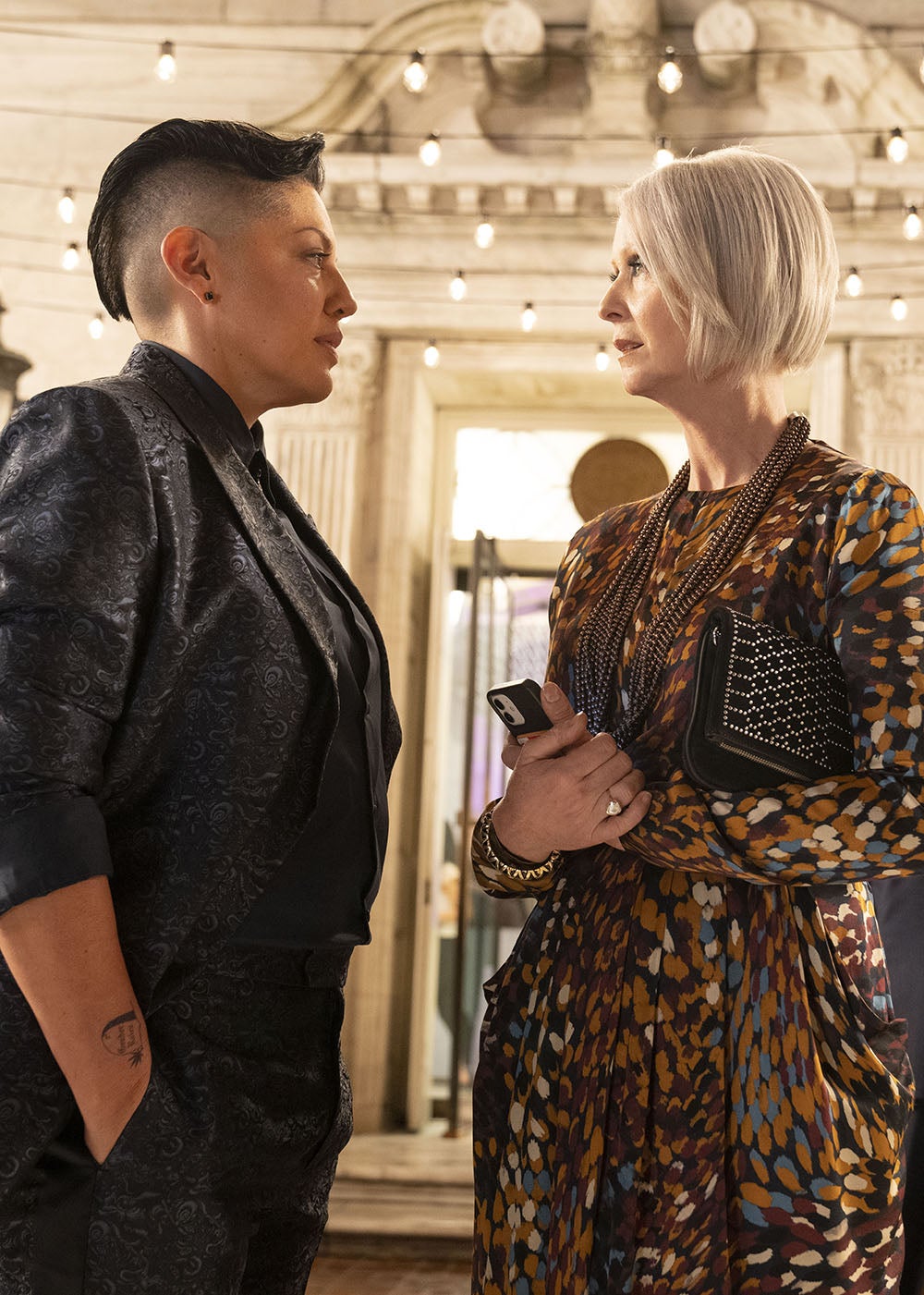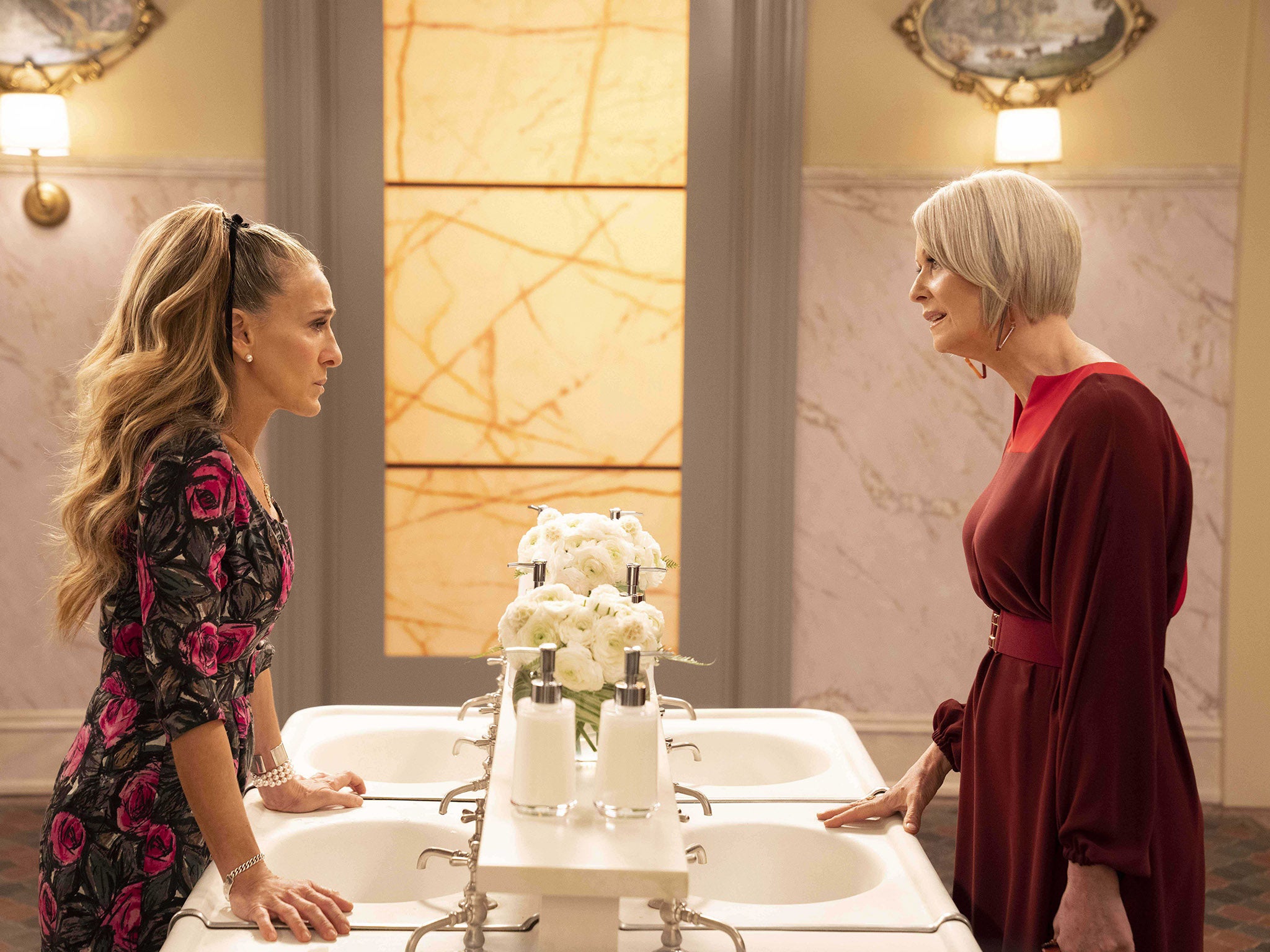Che and Miranda destroyed And Just Like That, but not in the way you think
Despite a handful of strong ideas, the ‘Sex and the City’ revival has been a polarising mess, with Sara Ramirez’s terminally unfunny stand-up comic often dubbed the source of its problems. But the show’s failings run deeper, writes Adam White


In the penultimate episode of And Just Like That, the chaotic revival of Sex and the City, poor, beleaguered Steve spoke for all of us. “This whole thing came up on me pretty damn fast,” he told Carrie, about his wife Miranda’s marriage-destroying fling with Che Diaz – inarguably the funniest non-binary stand-up slash motivational speaker in New York with a podcast and a “comedy concert” streaming on Netflix. “Can you help me out here?” Oh, Steve. We would if we could.
In a series defined by its creative missteps – from its uncertainty of tone to its struggles to integrate at least two of its new characters of colour – Sara Ramirez’s Che remains And Just Like That’s most egregious miscalculation. Since the beginning of the series, they’ve been memed into oblivion, accused of ruining the show and described as “the worst character on TV”.
Showrunner Michael Patrick King has been forced to repeatedly defend them, while Ramirez has been open about turning off the noise of vitriol. “I’m very aware of the hate that exists online, but I have to protect my own mental health and my own artistry,” she told The New York Times this week. But blame lies not with Ramirez, who has always given the character a punky allure. Nor (surprisingly) with Che themselves.
Rather, it lies with the show’s writers, who’ve chosen to make Che an unimpeachable disaster area instead of a radical, intriguing addition to a historically problematic franchise. Che, And Just Like That’s other characters, and us at home deserved better.
To describe And Just Like That as a polarising mess is a bit like saying Sarah Jessica Parker’s Carrie really loves shoes. Which, yes. Duh. Everything well written over the course of its 10 episodes – Carrie’s grief over Big, her complex estrangement from Kim Cattrall’s Samantha, Charlotte and her non-binary child, Sarita Choudhury’s beguiling realtor Seema – has been offset by narrative derangement.
Subplots have appeared and disappeared at will, characters change their personalities from episode to episode, 10 whole minutes of a limited series were devoted to Carrie being annoyed by a loud beeping in her kitchen. Despite a handful of strong ideas – and the eternal commitment and charisma of Parker – the show has overall been scatter-brained and uncertain of itself, as if its writers communicated solely by carrier pigeon.
The vortex of bafflement at the centre of it all has been Che. Introduced as Carrie’s boss and co-host on the sex and gender podcast XY & Me, Che is a cannabis-smoking, groupie-collecting lifestyle guru and almost hypnotically un-fun comedian. Think of them as Oprah if she said “pussy” a lot, or a cruise ship entertainer you’d want to throw overboard.
Playing off Che with almost maniacal awe is Cynthia Nixon’s Miranda, her mouth frozen into a surreal perma-grin whenever she’s in their company. Quite why Miranda has been so erotically enraptured by Che’s pat life lessons and bad comedy remains a mystery, but Che’s arrival has dramatically overhauled her existence regardless. After meeting Che and baying like a hyena during a romp with them in Carrie’s kitchen, Miranda left her husband Steve and – in this week’s finale – abandoned an internship with a human rights organisation to run off with Che to Los Angeles, where they’re filming a sitcom pilot. It’s a storyline that – on paper – could have been interesting, but has been written with the care of a toddler with a sledgehammer.
In And Just Like That… The Writers Room, a weekly podcast hosted by the show’s executive producer Michael Patrick King, he and his fellow writers have regularly discussed Miranda’s storyline and the reasons behind it. “I [wanted] to see Miranda completely undone by a new person, because she’s so calm and controlled all the time,” writer Samantha Irby explained. “I think it’s really refreshing to see her stumbling, vulnerable and not knowing what she’s doing.” Others have said that the story spoke to the moment we’re all in. What happens when a marital rut coincides with a pandemic? Do you wallow in stagnancy once you’ve been let out of your house? Or emerge determined to change your life?
These are great questions. Likewise seeing the show properly explore queerness – and echoing Nixon’s own late-in-life queerness – after a half-hearted attempt with Samantha in the original series. The problem, though, has been the lack of dialogue about it all. Whether it’s laziness or slight trepidation about engaging with queerness and gender rather than merely representing it, the show hasn’t really talked about Che Diaz. It may seem like a strange complaint. After all, Che seems to terrorise the show, popping up unexpectedly at apartments, bars and charity auctions. Few Che scenes go past without a breathless fan approaching them and frothing at the mouth with praise for their comedy, their life affirmations, or their apparently otherworldly bedroom skills. But actually listen to the show’s conversations, and everyone involved has chosen to plead the fifth rather than talk about them, or their dynamic with Miranda.

As audiences, we have seen Che profess their love for Miranda one week, then tell her the next she’s not their girlfriend and that they’re not even dating. We have seen Che flirt and have sex with Miranda and then not speak to her for three months. In the finale, Che chooses to tell Miranda that they’re moving to LA not in private but instead publicly (and through song! Agh!) – and at the same time as they tell their friends and family. In any other circumstance, such behaviour would be considered self-involved or manipulative, but here it is shrugged off. While we at home beg for someone – anyone! – to address one of the many elephants in the room, everyone on screen is curiously silent.
When Miranda announces at brunch that she is planning on asking Steve for a divorce, Charlotte is visibly bothered, but then seems to clam up. “I guess you know what you’re doing,” she offers. “It’s your life – what do I know about how you should handle it?” Earlier, when Charlotte first found out that Miranda had been cheating on Steve with Che, Carrie makes a joke about cheese rather than expressing any stance. Asked by Steve to help him understand why Miranda left him for Che, Carrie is stoic. “All I know is what she said to me – that it’s not about being with women, it’s about being with Che,” she says, before backing up into a tray of paint and bringing the conversation to a close. Carrie has also never addressed Che’s lack of respect for professional and personal boundaries. Even after Che showed up to her apartment and had sex with her married best friend while Carrie was half-conscious in the next room.
What’s bizarre about this is that Sex and the City has always been about difficult conversations. Carrie, Samantha, Charlotte and Miranda regularly critiqued one another’s romantic choices, discussed their partners and admonished each other when they needed to be admonished. Miranda was open about disliking Big; Charlotte and Miranda were furious with Carrie for cheating on Aidan; Carrie told Samantha that her sexual frankness made her uncomfortable. There was a level of honesty to their individual dynamics that felt real and believable: friends so at ease with each other that they could verbalise the typically unspoken.
All of that has been absent from And Just Like That, and replaced with an odd – and ethically dubious – paean to objectivism. Couple that with the endless hectoring from Che about the importance of “living your truth”, and the show seems to suggest that achieving personal happiness is the ultimate goal, regardless of whether others are harmed in the process. Similarly, characters have repeatedly reprimanded each other for “judging” people’s choices, as if maturity equals a kind of quiet indifference. But it’s a strangely cold message to push, as if growth can only arrive by divorcing yourself from opinions or friendly concern.
It hit its peak in And Just Like That’s finale, which practically recreated a similar scene from Sex and the City’s final season. There, Carrie has decided to abandon her sex column and her life in New York for Paris, where she plans to shack up with chilly Russian artist Alexandr (Mikhail Baryshnikov). What Carrie would actually do there – sans work and friends – is unclear. “You’re living in a fantasy!” Miranda cries, convinced that Carrie is making a deranged choice that she’ll come to regret. In the AJLT finale, the roles reversed, with Miranda giving up her internship to follow Che to LA. “What are you going to do all day?” Carrie asks. “Sit in an audience and laugh?”

True to form, And Just Like That doesn’t acknowledge the obvious parallels between both storylines, and the conversation doesn’t go anywhere, either. Carrie apologises for “judging”; Miranda opines that she should be “allowed” to change. She seems to miss the point, but before the scene can go further, guest star Hari Nef interrupts the pair and tells them to be friends again. Like so much of this new series, it feels like the writers get so close to a dramatic turning point, but then sprint 20 paces back.
Unlike (maybe) many, I would love And Just Like That to return for a second season. The show has always been interesting, regardless of its faults, and there have been nuggets of greatness here and there that have more than justified its existence. But the show’s nervous, perplexing treatment of Che and Miranda has been near-fatal. Of the show’s cast and crew, Nixon has been most vocal about its need to explore race, sexuality and gender this time around, to make up for the faults of the original series. But if the writers are skittish about digging into those themes, leaving mere representation to pick up the slack, then what good does it do anyone? If And Just Like That wasn’t willing to go there, then it shouldn’t have tried.




Join our commenting forum
Join thought-provoking conversations, follow other Independent readers and see their replies
Comments